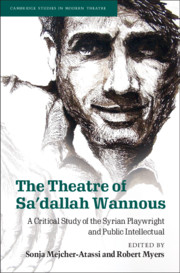Book contents
- The Theatre of Sa’dallah Wannous
- Cambridge Studies in Modern Theatre
- The Theatre of Sa’dallah Wannous
- Copyright page
- Contents
- Figures
- Contributors
- Acknowledgments
- Notes on Transliteration and Translation
- Chronology of Wannous’ Life, Plays, and Selected Writings
- Introduction
- Part I Situating Wannous
- Part II Reading Wannous
- Part III Staging Wannous
- 6 Rituals Transformed: Wannous, Intercultural Translation, and the Widening Gyre
- 7 Speaking the Unspeakable: On Directing Wannous
- 8 Conversation with Contemporary Playwright Mohammad Al Attar
- Part IV Remembering Wannous
- List of Wannous’ Plays
- Summaries of Wannous’ Principal Plays
- Bibliography
- Index
8 - Conversation with Contemporary Playwright Mohammad Al Attar
from Part III - Staging Wannous
Published online by Cambridge University Press: 14 May 2021
- The Theatre of Sa’dallah Wannous
- Cambridge Studies in Modern Theatre
- The Theatre of Sa’dallah Wannous
- Copyright page
- Contents
- Figures
- Contributors
- Acknowledgments
- Notes on Transliteration and Translation
- Chronology of Wannous’ Life, Plays, and Selected Writings
- Introduction
- Part I Situating Wannous
- Part II Reading Wannous
- Part III Staging Wannous
- 6 Rituals Transformed: Wannous, Intercultural Translation, and the Widening Gyre
- 7 Speaking the Unspeakable: On Directing Wannous
- 8 Conversation with Contemporary Playwright Mohammad Al Attar
- Part IV Remembering Wannous
- List of Wannous’ Plays
- Summaries of Wannous’ Principal Plays
- Bibliography
- Index
Summary
This chapter is a conversation between book editor Sonja Mejcher-Atassi and Mohammad Al Attar, one of the Arab world’s most celebrated younger playwrights. It is based on a talk Al Attar gave at the American University of Beirut in April 2015. In the conversation, Al Attar offers valuable insights into the significance of Sa’dallah Wannous’ plays and their legacy for a younger generation of playwrights in and from the Arab world. He shares his views about how Wannous’ language, style of writing, and ideas on the politicization of theatre impacted him as a student at the Higher Institute of Dramatic Arts in Damascus and later as a renowned playwright. Al Attar also attempts to read Wannous’ influence on the political, cultural, and literary scene of the 2011 Arab uprisings, especially the Syrian revolution.
Keywords
- Type
- Chapter
- Information
- The Theatre of Sa'dallah WannousA Critical Study of the Syrian Playwright and Public Intellectual, pp. 157 - 162Publisher: Cambridge University PressPrint publication year: 2021

